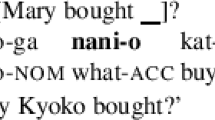Abstract
In the framework of the minimalist program, the assumption that wh-in-situ move covertly to be assigned wide scope is infeasible. Rather, it is assumed that they must be interpretable in situ, and that syntactic conditions like ‘superiority’ are effects of economy, which restricts overt rather than covert movement of a wh-element. The remaining syntactic problem for this line of reasoning is the putative ECP effects of adverbial wh-adjuncts, which were the strongest evidence for covert movement. A serious semantic problem is that the interpretative procedures which have been proposed for wh-in-situ – unselective binding or absorption – fail to capture correctly their interpretation. I will argue first that both problems are solved if the interpretation in situ employs choice functions, and it is the function variable, rather than an individual variable, which is long-distance bound by the question existential operator. Adverbial adjuncts, which cannot be interpreted via choice functions, cannot, therefore, be interpreted in situ. However, the concept of economy underlying the account of overt superiority effects requires both theoretical and empirical clarification (as it leaves some empirical problems unaddressed). I argue, following a proposal by Golan (1993), that in this case the economy considerations apply at the interface (‘interface economy’) and that they consider not only different derivations out of the same numeration, but also their semantic representation.
Similar content being viewed by others
REFERENCES
Baker, C. L.: 1970, ‘Notes on the Description of English Questions: The Role of an Abstract Question Morpheme’, Foundations of Language 6, 197–219.
Chomsky, Noam.: 1973, ‘Conditions on Transformations’, in S.R. Anderson and P. Kiparsky (eds.), A Festschrift for Morris Halle, Holt, Rinehart & Winston, New York, pp. 232–286.
Chomsky, Noam: 1992, A Minimalist Program for Linguistic Theory, MITWPL, MIT, Cambridge, Mass.
Chomsky, Noam: 1995, The Minimalist Program, MIT Press, Cambridge, Mass.
Collins, Chris: 1994, ‘Economy of Derivation and the Generalized Proper Binding Condition’, Linguistic Inquiry 25, 45–61.
Engdahl, E.: 1986, Constituent Questions, Reidel, Dordrecht.
Epstein, S. D.: 1992, ‘Derivational Constraints on A′ Chain Formation’, Linguistic Inquiry 23(2), 235–259.
Fodor, J. and I. Sag: 1982, ‘Referential and Quantificational Indefinites’, Linguistics and Philosophy 5, 355–398.
Fox, Danny: 1995, ‘Economy and Scope’, Natural Language Semantics 3(3), 283–341.
Golan, Yael: 1993, ‘Node Crossing Economy, Superiority and D-linking’, ms., Tel Aviv University
Grodzinsky, Yoseph and Tanya Reinhart: 1993, ‘The Innateness of Binding and Coreference’, Linguistic Inquiry 24(1), 69–101.
Groenendijk, Jeroen and Martin Stokhof: 1982, ‘Semantic Analysis of Wh-complements’, Linguistics and Philosophy 5(2), 175–234.
Hamblin, C.: 1973, ‘Questions in Montague English’, Foundations of Language 10, 41–53. Reprinted in B. H. Partee (ed.), Montague Grammar, Academic Press, New York, 1976.
Heim, Irene.: 1982, The Semantics of Definite and Indefinite Noun Phrases, Ph.D. dissertation, University of Massachusetts, Amherst, Published in 1989 by Garland, New York.
Higginbotham, James: 1985, ‘On Semantics’, Linguistic Inquiry 16, 547–593.
Higginbotham, James: 1992, ‘Interrogatives’, ms., MIT.
Higginbotham, James and Robert May: 1981, ‘Questions, Quantifiers and Crossing’, The Linguistic Review 1, 41–79.
Hilbert, D. and P. Bernays: 1939, Die Grundlagen der Mathematik II, second ed. (reprint 1970), Springer-Verlag, Berlin.
Hornstein, Norbert and Amy Weinberg: 1990, ‘The Necessity of LF’, The Linguistic Review 7, 129–167.
Huang, Jim: 1982, Logical Relations in Chinese and the Theory of Grammar, Ph.D. dissertation, MIT.
Karttunen, Lauri: 1977, ‘The Syntax and Semantics of Questions’, Linguistics and Philosophy 1, 1–44.
Kayne, Richard: 1984, Connectedness and Binary Branching, Foris, Dordrecht.
Lappin, Shalom and Tanya Reinhart: 1988, ‘Presuppositional Effects of Strong Determiners’, Linguistics 26, 1021–1037.
Lasnik, Howard and Mamoru Saito: 1992, Move Alpha, MIT Press, Cambridge, Mass.
Lewis, David: 1975, ‘Adverbs of Quantification’, in E. Keenan (ed)., Formal Semantics of Natural Language, Cambridge University Press, Cambridge, pp. 3–15.
Nishigauchi, Taisuke: 1986, Quantification in Syntax, Ph.D. dissertation, University of Massachusetts, Amherst.
Pesetsky, David: 1987, ‘Wh-in-Situ: Movement and Unselective Binding’, in E. Reuland and A. ter Meulen (eds.), The Representation of(In)definiteness, MIT Press, Cambridge, Mass, pp. 98–129.
Reinhart, Tanya: 1981, ‘A Second Comp Position’, in A. Belletti et al. (eds.), Theory of Markedness in Generative Grammar, Scuola Normale Superiore, Pisa, pp. 517–557.
Reinhart, Tanya: 1983, Anaphora and Semantic Interpretation, Croom-Helm, London.
Reinhart, Tanya: 1991, ‘Elliptic Conjunctions: Nonquantificational LF’, in A. Kasher (ed.), The Chomskyafn Turn, Blackwell, Oxford, pp. 360–384.
Reinhart, Tanya: 1992, ‘Wh-in-Situ: An Apparent Paradox’, in P. Dekker and M. Stokhof (eds.), Proceedings of the 8th Amsterdam Colloquium, 1991. Institute for Logic, Language and Computation, University of Amsterdam, pp. 483–492.
Reinhart, Tanya: forthcoming, Interface Strategies, MIT Press, Cambridge, Mass.
Reinhart, Tanya and Eric Reuland: 1993, ‘Reflexivity’, Linguistic Inquiry 24, 657–720.
Ruys, Eddy: 1992, The Scope of Indefinites, Ph.D. Dissertation, Utrecht University, published in the OTS Dissertation Series, University of Utrecht.
Szabolcsi, Anna and Frans Zwarts: 1993, ‘Weak Islands and an Algebraic Semantics for Scope Taking’, Natural Language Semantics 1(3), 235–285.
Author information
Authors and Affiliations
Rights and permissions
About this article
Cite this article
Reinhart, T. Wh-in-situ in the Framework of the Minimalist Program. Natural Language Semantics 6, 29–56 (1998). https://doi.org/10.1023/A:1008240014550
Issue Date:
DOI: https://doi.org/10.1023/A:1008240014550




